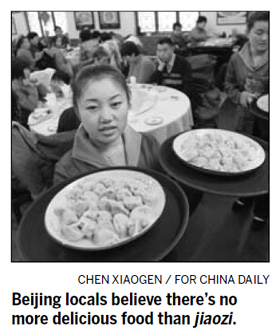Universal favorite for all seasons
Updated: 2011-10-17 11:32
By Ye Jun (China Daily)
|
|||||||||||
 Beijing
Beijing
The expatriates I know in Beijing may have different views on various Chinese cuisines, but they all share one thing in common. I have not yet met one who does not like eating jiaozi or boiled dumplings.
Its easily acceptable great taste probably justifies why it is important both as a staple, and a festival food.
In fact, Beijingers like it so much they traditionally eat jiaozi on all occasions and not just on the Chinese New Year's Eve, but also during the winter solstice on Dec 23 when they celebrate xiao nian or the "little New Year".
Again, on lixia, a solar term marking the beginning of summer on May 5 or 6, dumplings are eaten.
They are eaten on birthdays, weddings, funerals and even to celebrate the start or end of a journey to send off or welcome the wanderers home.
Beijingers have a saying: "There is no more comfortable position than lying down, and there is no more delicious food than jiaozi", which sums up their attitude towards the dumplings.
In the south, it's different. Dumplings are not eaten for the Spring Festival, and they prefer a full banquet of auspiciously named dishes with their favorite staple, rice.
In the north, the Chinese are emotionally attached to jiaozi because it is a tradition both in the eating and making during the Lunar New Year or Spring Festival.
Every member of the family will have a part in the process whether it be mincing the meat and chopping the vegetables for the filling, kneading the dough and rolling out the wrappers, or actually making the dumplings and laying them out in neat rows on bamboo mats.
Jiaozi is now a convenience food available in supermarkets as well, with frozen dumplings packed to serve two or four or a whole family.
There are special restaurants who serve nothing but jiaozi, offering a vast variety of fillings. Classic choices are leek with egg, pork with cabbage, and seafood.
Dumplings made with pork and shepherd's purse will always be my favorite. When I was a boy, my mother would go out to the fields and gather the herb and bring it home to cook.
The fillings also reflect regional differences.
In the coastal cities of Shandong and Hebei, they make jiaozi with a delicious mackerel stuffing, while in the Northeast, they prefer a stuffing made with sour pickled cabbage and pork.
In Xi'an in Shaanxi, Defachang Jiaozi Restaurant developed an entire banquet of just dumplings. The dumplings are not just boiled, but steamed, roasted, deep-fried and sauted and they may be salty, spicy, sweet or tongue numbing.
The climax of the banquet is a hot pot of chicken and duck broth with mushrooms that is served with miniature dumplings the size of pearls.
In the fancier restaurants nowadays, you may even get sea cucumber, crabmeat and crab roe in the stuffing.
But the simple things - cabbage, fennel and shepherd's purse - remain the all-time classics. Deep within, many Chinese all have a particular filling they will never grow tired of eating again and again.